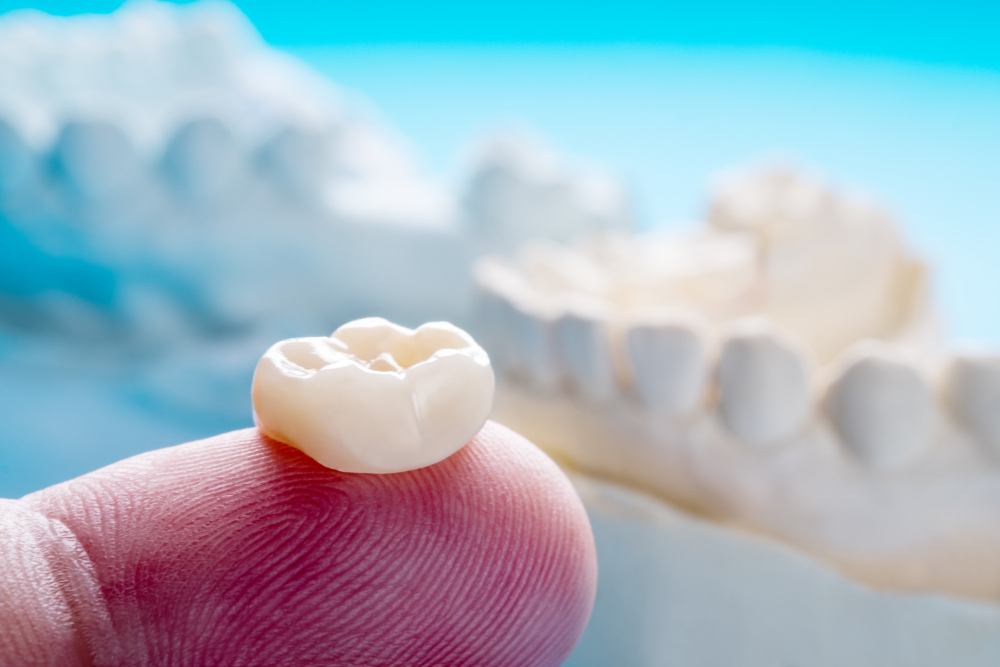Dental crowns are an everyday solution for many dental problems. They are like little caps put on your teeth to make them strong and look nice. Dentists suggest them to fix issues such as decay, missing parts, or after root canals. Let’s explore how these crowns work and why they might be right for you.
Understanding Dental Crowns
Dental crowns are like caps placed over a tooth. They restore its shape, strength, and appearance. When a tooth is badly worn down or cracked, a crown gives it a new life. Different materials make up these crowns, each offering unique benefits.
Here are four main types of dental crowns:
- Porcelain or Ceramic: These match your tooth color perfectly, making them a popular choice for dental crowns for front teeth.
- Metal Crowns: Made from alloys like gold or palladium. They’re tough and last a long time.
- Resin Crowns: Often used for temporary dental crowns as they’re inexpensive and less durable.
- Porcelain-fused-to-metal: Useful when both strength and appearance are necessary.
Dentists often recommend crowns to help several conditions:
- Tooth Decay: When fillings aren’t enough.
- Root Canals: After the procedure, to protect what’s left of the tooth.
- Broken or Fractured Teeth: To restore function.
- Dental Implants: Placing a crown on top completes the implant process.
With these insights, you get why dental crowns are often suggested. They save and protect teeth, improving both form and function.
The Dental Crown Procedure: Demystifying the Process
The first step in getting a crown is seeing a dentist. The dentist performs an initial evaluation to check the necessary treatment plan.
Here’s a general overview of the dental crowns procedure:
- Initial Examination: The dentist examines your tooth to see if it needs a crown.
- Tooth Preparation: A small amount of tooth is removed to make space for the crown.
- Choosing the Crown Material: Decide on the material based on your needs, from cosmetic porcelain to durable metal.
- Taking Impressions: A mold or digital image of your tooth is made. This creates the perfect fit.
- Temporary Crown: While waiting for your permanent crown, you might get a temporary dental crown to protect your tooth.
- Final Fitting: Once the permanent crown is ready, it’s carefully fitted and then cemented in place.
Each step is vital to ensure your dental crowns are comfortable and functional. This process protects your tooth, offering it a new lease on life.
Benefits of Dental Crowns for Oral Health and Aesthetics
Crowns offer many health and beauty benefits. Here’s why they can be so valuable:
- Protection and Sealing: Crowns seal your tooth and prevent future decay or even infections.
- Restoration of Structure: They restore damaged teeth, making chewing and talking more comfortable.
- Aesthetic Boost: Getting dental crowns for front teeth can significantly enhance your smile. They can cover discolored or oddly-shaped teeth, improving how you look.
For many, crowns also boost self-esteem and confidence by brightening their smiles and restoring functionality.
Resetting Misconceptions and Emphasizing Aftercare
Many worry about possible discomfort or complications from crowns. Concerns may include dental crowns pain or sensitivity, especially right after placement. However, these effects are usually short-lived and easily managed.
It’s important to clear up a few myths and emphasize facts. Dental crowns are durable with proper care. They don’t break easily, and they protect teeth for years.
Maintaining crowned teeth is straightforward:
- Brush and floss regularly, just like natural teeth.
- Avoid biting hard things, like ice, to prevent damage.
- Visit your dentist regularly to check your crowns.
With these simple tips, your crowns can last much longer and ensure a healthy, long-lasting smile.
Choosing What’s Right for Your Oral Health: Consulting Your Dentist
Dental crowns can significantly change your teeth’s health and appearance. Whether dealing with decay or aiming for a better smile, crowns can offer a simple solution.
It’s crucial to talk to your dentist about dental crowns vs veneers if you’re unsure which one is right. Sometimes, choosing between a crown and another type, like dental crowns and bridges, requires professional advice.
Talking to your dentist ensures a decision tailored to your unique needs. They’ll guide you through options, ensuring your choice enhances both your oral health and comfort.
In conclusion, dental crowns play a crucial role in transforming oral health in several ways, from protection to aesthetics. With the right guidance from our dentist, you can experience all the advantages they bring.

